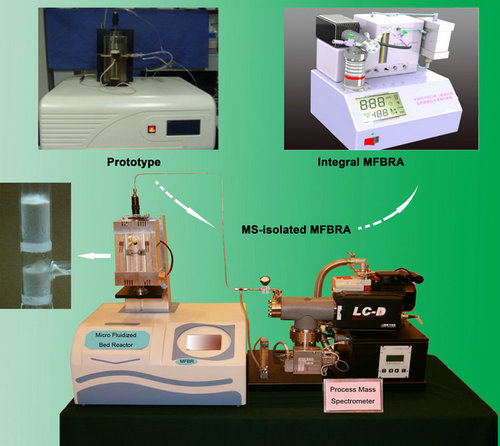The research team led by Prof. XU Guangwen at the State Key Laboratory of Multi-Phase Complex System, Institute of Process Engineering, Chinese Academy of Sciences (IPE), has successfully developed a novel gas solid reaction analysis instrument shown in the figure by using the so-called micro fluidized bed (MFB) as the reactor, called the Micro Fluidized Bed Reaction Analyzer (MFBRA).
The measurement and characterization of gas solid reactions have used generally micro fixed bed reactors with non-isothermal heating of a preset reactant sample. Both thermogravimetric balance (TG) and mesh reactor analyzer are the typical instruments of this kind. The use of MFB in the MFBRA grants the analyzer several special functions including 1) allowing the on-line pulse feeding and rapid heating of particle reactant in milligrams and micrometers to ensure the isothermal differential reaction conditions, 2) strengthening the heat and mass transfer for the differential reaction to minimize the inhibition of diffusion to reactions, and 3) enabling the on-line monitor of the gas product with fast process mass or other spectrometer to generate the time-series changes of product gas composition. Based on the measured instantaneous gas composition, one can estimate the reaction rate and isothermal kinetic parameters and further analyze the mechanism of the reaction. With fine powder reactants the MFBRA can also minimize the intra-particle diffusion limitations. Consequently, the MFBRA provides essentially the diffusion-minimized isothermal differential analysis for gas solid reactions so that the resulting characteristics and kinetics are close to the intrinsic reaction natures.
The preceding characteristics of the MFBRA have been well demonstrated by testing a number of typical gas-solid reactions including the CO2 capture with Ca(OH)2, pyrolysis of biomass, graphite combustion, CuO reduction by CO and so on. The results show as well that the MFBRA is highly suitable for the quick and complex reactions of thermally unstable materials like coal, biomass and various metal hydrates and carbonates.
The preceding results about the MFBRA have been published in Fuel, AIChE Journal (2010, 56: 2905-2912), Chemical Engineering Journal (2011, 168: 839-847), Scientia Sinica Chimica (2011, 41: 152-160) and so on. Financially supported by a National Scientific Instrumentation Grant project, the research team of Prof. Xu is carrying on the work for developing and utilizing the integral MFBRA which, as illustrated in the figure, integrates the reaction system and the gas analysis spectrometer into one single instrument. A few function expansions will be also implemented in the three years of this project, and more than 20 MFBRAs are expected to be deployed in Chinese universities and institutes.
AUTHOR CONTACT: XU Guangwen
Institute of Process Engineering, Chinese Academy of Sciences.
Beijing, China, Phone: 86-10-82544905; E-mail: gwxu@home.ac.cn

Figure Pictures of the Micro Fluidized Bed Reaction Analyzer (MFBRA) in the development stages from prototype to integrated analyzer (Image by IPE)
 Search
Search




 京公网安备110402500047号
京公网安备110402500047号